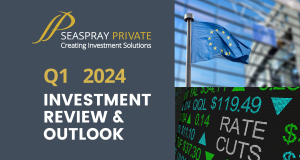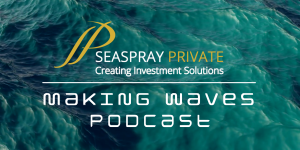Summary
After seeing a severe shock in March, equities have rebounded strongly in April and into the start of May. We are over a month on now from those equity lows, and we have seen a performance bounce almost across the board with many indices chalking up double-digit gains. Gold also had a strong month, benefiting from continued hedging and diversification demand. Clearly the exception to the positive sentiment was the oil price, which continued to fall, with WTI Crude Oil’s May futures contract famously going negative just a day before its expiry. COVID-19 continued to spread globally throughout the month, however with many countries seeing their ‘new daily case’ rates start to drop off and are now in the very early phases of reopening their respective economies. Over the past month we have seen fixed income rally, albeit with lower volatility than before, supported by the massive amount of monetary accommodation introduced globally. We also saw credit outperform government bonds in general.

An important factor influencing the April equity rally was the move taken by governments and central banks to introduce very significant stimulus measures over the past couple of months in order to reduce the damage caused by the economic shutdown. These moves by governments and central banks alike have served to restore some positive sentiment to markets. What happens next continues to depend heavily on the shape of case and mortality curves globally, but it is certainly true that investor risk appetite has improved greatly over the last month or so.
After what has been a stream of poor quarterly earnings results and global economic data points, we expect to see much of the same if not worse for Q2 2020, most of which has likely already been priced into equity markets. We anticipate that economies in the US and Europe will rebound sharply in Q3, with additional gains to be made in Q4 as the world returns to a more normal and rational state. This theory assumes two key factors:
- That even in the event of a second wave of the virus, developed countries will have built up enough capacity within their health systems and made adequate provisions for personal protective equipment (PPE) in order to address this health emergency.
- As one global population, we will have made some progress toward achieving herd immunity, so that further outbreaks would no longer necessitate the sort of drastic lockdowns that were imposed over the last two months.
Equity markets will likely continue to be volatile and difficult to trade over the next few weeks and months, with sizable moves in both directions, but longer-term opportunities are continuing to present themselves.
Our view
We believe opportunities are starting to unfold in companies with low leverage, differentiated business models and strong structural growth potential. Clearly during times like these, a strong nerve is required when buying stocks, and it may well not be plain sailing, but for those taking a longer-term view, we believe some attractive entry points are beginning to emerge in specific names on our stock watchlist.
and ….
For existing long-term investors in well diversified multi asset / multi manager portfolios our core advice remains: Wash your hands. Ignore the current volatility in markets. Keep Social Distancing. And don’t panic about your stocks! We will advise you if changes are needed.
One clear feature of the current crisis and of Q1 earnings season is that many companies are adopting a much broader interpretation of their responsibility to stakeholders than in previous crises. This sense of a broader responsibility has manifested itself in some of the decisions taken in relation to cut or in some cases completely remove dividend payments for 2020. Rather than dismiss staff, many companies have sent their workforce home on full pay and have cancelled or deferred dividend payouts. In short, companies are increasingly prioritizing the needs of their workforce over their shareholders. Our view is that companies that treat their employees well will be better placed to get their businesses back on the path to growth once economic conditions return to normal.
Against this backdrop, we believe a discerning approach to security selection will be critical in identifying those investments with prized characteristics – such as durable business models, robust cash generation, solid balance sheets, and sound environmental, social and governance profiles – which will enable them to survive the current downturn and return to growth once economic conditions normalize.
Whether the current recession be V-shaped, U-shaped, or resemble a Nike tick, there is one area in which we are willing to make a prediction: strong companies will come out of this crisis stronger and weak companies will come out weaker. We are of the view that the equity market correction of 2020 has put a good number of market-leading companies on sale at what could potentially be generationally low prices. We have always actively avoided companies that have higher leverage, are potentially exposed to dilutive capital raises and government bailouts and face higher risk of experiencing an L-shaped recovery in their business relative to the shape of the economic recovery. We have sought to purchase leading companies that are likely to accelerate their market share gains, are well capitalized, and are more likely to experience U-shaped or even V-shaped recoveries relative to the overall economy.
We are open to the possibility that we may have already seen the bottom for equity markets in late March, We should not be surprised if, when we look back in a few years’ time, that the bottom of the coronavirus ‘crash’ was at the time of peak new daily cases and widespread lockdowns across the world. We have pointed out this theory in our most recent quarterly update and in numerous daily updates, that equity markets may well have put in their longer-term lows at the same time as certain key nations experienced their peaks in ‘new daily cases’. We would also point out, that historically equity markets put in their lows 3 to 6 months before recessions end. We believe that we will be out of any recession and in recovery mode for the second half of the year.
Having said this, we acknowledge that we could very easily see one more leg lower in May or June. We are aware that bear markets often bring with them the risk of short squeezes, which we may have witnessed with April’s sharp rally. That being said, squeeze or no squeeze, we still believe that in the second half of the year we will see a gradual global economic recovery after a very weak first half. If this scenario does begin to play out, we forecast that equities will be a leading indicator, markets are constantly living in the future so it should be expected that the market rebound will precede the macro one. If another equity drop comes, possibly as markets get nervous about the lockdown easing in Europe and a potential second wave, this final leg lower in stocks would present us with excellent long-term investment opportunities.
We have also been focusing our research on individual company names that should do well from the changing spending patterns due to the virus, along with companies where business should rebound sharply when the world starts to go back to normal. One of the benefits of our small and well-experienced team at Seaspray is that we are in a position to act quickly and decisively if we feel a market bottoming out process is happening and will have our stock watchlist ready.
We do not own the broad market; we own a heavily researched group of stocks that we have conviction in for the long term. That can be reassuring when markets are anything but. As the repercussions of the global lockdown response to COVID-19 become clearer, many corporate boards are cutting dividends in response to commercial and regulatory pressure. Some industries, such as airlines, are facing an unprecedented period with almost no business until more normal life resumes.
In fact, we think the market has been rather rational in sorting out those industry sectors and business models that are most at risk relative to those that are more durable and insulated. For example, the most pain has been felt within the energy sector, which makes sense given the dual challenges of a global demand shock and a ruthless price war between two of the world’s largest oil producers. On the other end of the spectrum, consumer staples and Health Care stocks have held up comparably well. Given the fact that many countries have spent the last month in complete or at least partial lockdown, increased demand for consumer staples makes perfect sense. Health Care stocks have held up due to a mix of defensiveness, particularly in pharmaceuticals, and a strongly held belief that the current decline in elective procedures is transitory.
The current crisis has accelerated the growing trend of unifying monetary and fiscal policy to deal with structural issues. In spite of the epic scale of the recent monetary intervention, Fed Chair Jerome Powell has emphasized that monetary policy was not the main tool for responding to the sudden economic impact of the virus, and that its prime purpose was to provide liquidity for financial systems under stress, and support demand through lower interest rates. To prop up the economy, the largest fiscal stimulus package in US history, signed into law at the end of March, will offer direct paychecks (essentially a form of ‘helicopter money’) to many Americans who cannot work or who have lost their jobs as a result of the outbreak, as well providing loans to both SME’s and large corporations, and giving health-care providers much-needed additional resources.
We stand by our forecast from our quarterly investment update just a month ago: we expect that the extraordinary monetary and fiscal response that we have seen will lift the global economy back into expansion in H2 of 2020. In fact, we would not be at all surprised if 2020 sees one of the shortest recessions ever. Still, the recovery will of course be slower than the descent and the global economy seems unlikely to fully recover from the coronavirus until well into next year.
One final note.
There was significant insider buying of stocks during the worst part of the first quarter meltdown. This is usually a good sign indicating that corporate insiders believe their company’s stocks are oversold and represent legitimate value. We know the next few months will most likely remain volatile, but we also know that strong companies vital to the economy will come out ahead as things inevitably return to normal, however slowly. We see a rare opportunity now to buy such companies at significant discounts to where they were trading before the crisis.
If you would like to discuss anything raised above or would like a review of your financial position, please do not hesitate to contact us
Tel: +353 1 70 70 000 or info@seasprayFS.ie
Warning: The value of your investment may go down as well as up and you may lose some or all of the money you invest. Past performance is not a reliable guide to future performance. Investments denominated in a currency other than your base currency may be affected by changes in currency exchange rates.
https://seasprayfinancialservices.ie/important-disclosures/
This material is approved for distribution in Ireland by Seaspray Financial Services Ltd .It is intended for Irish retails clients only and is not intended for distribution to, or use by, any person in any country where such distribution or use would be contrary to local law or regulation. Seaspray Financial Services Ltd Ire (“SFS”) is regulated by the Central Bank of Ireland.
Where SFS wishes to make this and other Seaspray Financial Services Ltd research available to Retail clients, such information is provided without liability and in accordance with our terms and conditions that are available on the SFS website.
No report is intended to and does not constitute a personal recommendations or investment advice, nor does it provide the sole basis for any evaluation of the securities that may be the subject matter of the report. Specifically, the information contained in this report should not be taken as an offer or solicitation of investment advice, or to encourage the purchased or sale of any particular security. Not all recommendations are necessarily suitable for all investors and SFS recommend that specific advice should always be sought prior to investment, based on the particular circumstances of the investor either from your SFS investment adviser or another investment adviser.
SFS takes all responsibility to ensure that reasonable efforts are made to present accurate information but SFS gives no warranty or guarantee as to, and do not accept responsibility for, the correctness, completeness, timeliness or accuracy of the information provided or its transmission. This is entirely at the risk of the recipient of the report. Nor shall SFS, its subsidiaries, affiliates or parent company or any of their employees, directors or agents, be liable to for any losses, damages, costs, claims, demands or expenses of any kind whatsoever, whether direct or indirect, suffered or incurred in consequence of any use of, or reliance upon, the information. Any person acting on the information contained in this report does so entirely at his or her own risk
All estimates, views and opinions included in this research note constitute Seaspray Financial Services judgment as of the date of the note but may be subject to change without notice. Changes to assumptions may have a material impact on any recommendations made herein.
Unless specifically indicated to the contrary this research note has not been disclosed to the covered issuer(s) in advance of publication.
Past performance is not a reliable guide to future performance. The value of your investment may go down as well as up. Investments denominated in foreign currencies are subject to fluctuations in exchange rates, which may have an adverse affect on the value of the investments, sale proceeds, and on dividend or interest income. The income you get from your investment may go down as well as up. Figures quoted are estimates only; they are not a reliable guide to the future performance of this investment.
Conflicts of Interest & Share Ownership Policy
It is noted that research analysts’ compensation is impacted upon by overall firm profitability and accordingly may be affect ed to some extent by revenues arising other Seaspray Financial Services Ltd business units including Investment Management and Corporate Finance. Revenues in these business units may derive in part from the recommendations or views in this report. Notwithstanding, Seaspray Financial Services Ltd is satisfied that the objectivity of views and recommendations contained in this note has not been compromised. Nonetheless Seaspray Financial Services Ltd is satisfied that the impartiality of research, views and recommendations remains assured.
Analyst Certification
Each research analyst responsible for the content of this research note, in whole or in part, certifies that: (1) all of the views expressed accurately reflect his or her personal views about those securities or issuers; and (2) no part of his or her compensation was, is, or will be, directly or indirectly, related to the specific recommendations or views expressed by that research analyst in the research note.
We have assessed the publication and have classed it as Research under MIFID II. All charges in relation to this publication will be borne by Seaspray Financial Services Ltd
EON.





